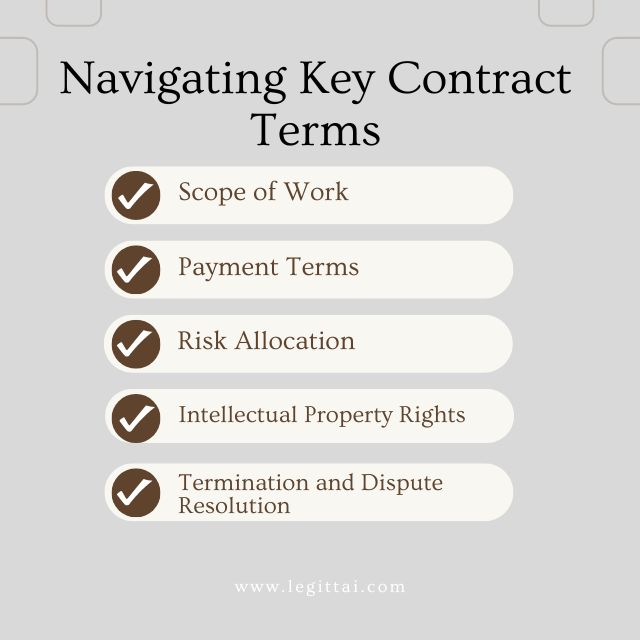Negotiating contract terms is a critical aspect of business transactions, shaping the foundation of agreements and relationships. A well-negotiated contract can safeguard interests, mitigate risks, and foster collaboration between parties. In this comprehensive guide, we explore effective strategies and best practices for negotiating contract terms to achieve success in your business dealings.
Understanding the Importance of Negotiation
Negotiation is the art of reaching mutually beneficial agreements while addressing the interests and concerns of all parties involved. It’s a strategic process that requires effective communication, collaboration, and compromise. Successful negotiation sets the stage for productive partnerships and ensures that contracts reflect the objectives and expectations of all stakeholders.
Preparing for Negotiation
- Know Your Objectives: Before entering negotiations, clearly define your goals, priorities, and non-negotiable terms. Understand what outcomes you hope to achieve and anticipate potential areas of contention.
- Conduct Thorough Research: Familiarize yourself with industry standards, market trends, and legal requirements relevant to the contract. Research the counterparties involved to understand their needs, preferences, and negotiation styles.
- Gather Necessary Information: Compile all relevant documentation, including previous contracts, market analyses, and regulatory guidelines. Having comprehensive information at hand will strengthen your negotiating position and support your arguments.
Building Rapport and Establishing Trust
- Establish Open Communication: Foster a collaborative atmosphere by promoting transparency, active listening, and constructive dialogue. Encourage all parties to express their concerns and aspirations openly.
- Focus on Mutual Benefits: Frame negotiations as a partnership aimed at achieving shared objectives. Emphasize the value that each party brings to the table and explore opportunities for mutual gain.
- Build Long-Term Relationships: Prioritize relationship-building over short-term gains. Cultivating trust and goodwill lays the groundwork for future collaborations and reinforces your reputation as a reliable and fair business partner.
Navigating Key Contract Terms

- Scope of Work: Clearly define the scope of work, deliverables, timelines, and performance metrics to avoid misunderstandings and disputes later on.
- Payment Terms: Negotiate payment terms that align with your cash flow requirements and financial objectives. Consider factors such as payment schedules, invoicing procedures, and acceptable forms of payment.
- Risk Allocation: Allocate risks and liabilities fairly between parties to minimize exposure to potential losses or damages. Address contingencies, indemnification clauses, and insurance requirements to mitigate risk effectively.
- Intellectual Property Rights: Clarify ownership, licensing rights, and usage permissions related to intellectual property created or shared during the contract term. Ensure compliance with copyright, trademark, and patent laws.
- Termination and Dispute Resolution: Establish clear procedures for contract termination, including notice periods, grounds for termination, and dispute resolution mechanisms. Consider alternative dispute resolution methods like mediation or arbitration to expedite resolution.
Overcoming Challenges and Deadlocks
Focus on Interests, Not Positions: Shift the focus from entrenched positions to underlying interests and needs. Explore creative solutions and compromises that address the core concerns of all parties.
- Maintain Flexibility: Be willing to adapt and adjust your negotiating stance based on new information or changing circumstances. Avoid rigid adherence to predetermined outcomes that may impede progress.
- Seek Win-Win Solutions: Strive for outcomes that benefit all parties involved, fostering goodwill and cooperation. Look for opportunities to expand the pie rather than engaging in zero-sum negotiations.
- Documenting the Agreement: Once negotiations are complete, document the agreed-upon terms in a written contract. Ensure that the contract reflects the intentions and understandings of all parties accurately.
- Reviewing Legal Implications: Seek legal review and advice to verify the enforceability and compliance of the contract with relevant laws and regulations. Address any potential legal risks or ambiguities proactively.
- Securing Signatures: Obtain signatures from all parties involved to formalize the agreement. Consider using electronic signature platforms for convenience and efficiency.
Negotiating contract terms is a complex yet essential aspect of business transactions. By employing effective strategies, fostering collaboration, and prioritizing mutual interests, you can navigate negotiations successfully and secure agreements that drive value and promote sustainable relationships. With careful preparation, open communication, and a focus on long-term outcomes, negotiating contract terms can become a cornerstone of your business success.
Did you find this Legitt article worthwhile? More engaging blogs about smart contracts on the blockchain, contract management software and electronic signatures can be found in the Legitt Blogs section. You may also contact Legitt to hire the best contract lifecycle management services and solutions.
FAQs on Negotiating Contract Terms
What are the key elements of successful negotiation?
Successful negotiation entails clear goal-setting, thorough research, open communication, and a focus on mutual benefits.
How can I prepare effectively for contract negotiations?
Effective preparation involves defining objectives, gathering information, and understanding the interests of all parties involved.
Why is building rapport important in negotiation?
Building rapport fosters trust, encourages collaboration, and facilitates constructive dialogue, laying the foundation for successful negotiations.
What are some common contract terms that require negotiation?
Common contract terms include scope of work, payment terms, risk allocation, intellectual property rights, termination, and dispute resolution mechanisms.
How can I overcome challenges and deadlocks during negotiations?
Overcoming challenges requires focusing on underlying interests, maintaining flexibility, and seeking win-win solutions to reach mutually acceptable outcomes.
What steps should I take to finalize a negotiated agreement?
Finalizing an agreement involves documenting the terms accurately, reviewing legal implications, and obtaining signatures from all parties involved.
Why is legal review important before finalizing a contract?
Legal review ensures the enforceability and compliance of the contract with relevant laws and regulations, minimizing legal risks and ambiguities.
What role does flexibility play in negotiation?
Flexibility allows negotiators to adapt their strategies based on new information or changing circumstances, facilitating progress and agreement.
How can I ensure that negotiated agreements promote long-term relationships?
Prioritizing mutual interests, fostering goodwill, and emphasizing collaboration contribute to agreements that promote sustainable relationships.
What are the benefits of employing effective negotiation strategies in business transactions?
Effective negotiation strategies lead to agreements that drive value, mitigate risks, and strengthen partnerships, enhancing overall business success.






















